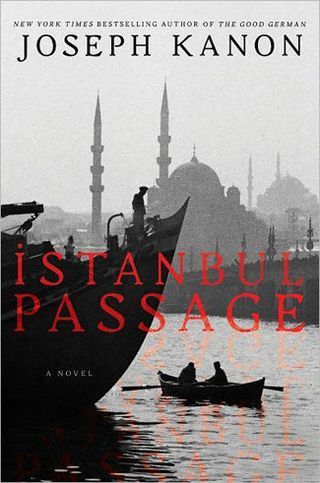Escaping to Istanbul
We all seem to have our "escape" genres - the books we turn to when we just want to lose ourselves in a story. For some it's sci-fi, or fantasy, or romance, or horror. For me it's thrillers - not murder mysteries so much as international espionage, set in places I either know well, or have never been, often with some sort of historical interest. (No, in case you're wondering, I've never read anything by Gérard de Villiers, perhaps I should!)
 I like to listen to audio books while I'm walking, or riding the metro, or exercising on the boring elliptical in the basement. My most recent was Istanbul Passage by Joseph Kanon, a story of spies, counter-spies, politics and personal relationships, set in Istanbul at the end of WWII. The title refers to the passage of boatloads of Jews, released from concentration camps in Eastern Europe, through Istanbul on their way to Palestine. Both money and information change hands, in this case putting American, British, Russian, Romanian, and Turkish interests on a collision course.
I like to listen to audio books while I'm walking, or riding the metro, or exercising on the boring elliptical in the basement. My most recent was Istanbul Passage by Joseph Kanon, a story of spies, counter-spies, politics and personal relationships, set in Istanbul at the end of WWII. The title refers to the passage of boatloads of Jews, released from concentration camps in Eastern Europe, through Istanbul on their way to Palestine. Both money and information change hands, in this case putting American, British, Russian, Romanian, and Turkish interests on a collision course.
Contributing to this book's appeal for me was Jeffrey Mays' mesmerizing reading performance, which brought the characters and their dialogue to life in a way I simply wouldn't have appreciated as much if reading a printed copy. I thought his subtle command of accents, and sensitive portrayal of both male and female characters, was a tour-de-force.
Joseph Kanon tells a good story, and even if some of the plot is predictable, the characters are well-written, believable, and multidimensional. One of the major highlights of the book is its setting, with the city of Istanbul and the Bosphorus evocatively described by someone who obviously knows and loves them well. (Readers of this blog already know my affection for Orhan Pamuk, who has written some pretty suspenseful novels himself, but I've always had a desire to go to Istanbul, and this book increased that yearning.)
Kanon is sometimes compared to Graham Greene, and I can see why; this book is not merely a thriller, but an exploration of complicated moral issues in a way that Greene, I think, would have appreciated. The relationship between a man and three women - the protagonist's wife, confined to a mental institution; the prostitute he visits on Thursday afternoons; and the wife of a high-level American consul -- is set inside the larger story of espionage, itself complicated by personal relationships between various characters who have to balance their allegiance to particular causes with actual friendships. Nothing is black-and-white in this place where the fall of the Ottoman empire is a recent, stinging memory, but international politics and power still collide.
Some days after finishing the book, I found myself troubled by the fact that books like this hinge on the consequences of atrocities, especially, here, a particularly horrible massacre that occured in a Romanian concentration camp. There's a learning aspect, for sure; I've always felt that novels and films had tremendous power to educate and to influence, as well as to misinform and manipulate our emotions and opinions. And yet, I didn't think about that very much as I was listening to the story; I was detached from the actual events. It's another moral issue, isn't it - the use of war, genocide, and violence, as well as more individual and personal crimes, to entertain, and to profit? I find this the most problematic in movies, but I never really thought about it in terms of fiction, especially literary fiction. But as in Graham Greene, the subtlety of Kanon's presentation of moral questions and gray areas suggests to me that he may have thought about it himself. I think it would be a mistake to read Istanbul Passage as a story only, without considering the questions it raises: how people use each other; the limits of friendship; the cost of betrayal; the way ordinary people become pawns of those with greater power, forced to make decisions they never would have made; and the stories we tell ourselves afterward, to make it all go down more easily.



